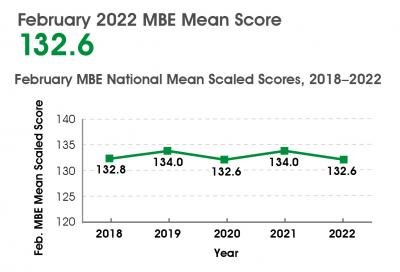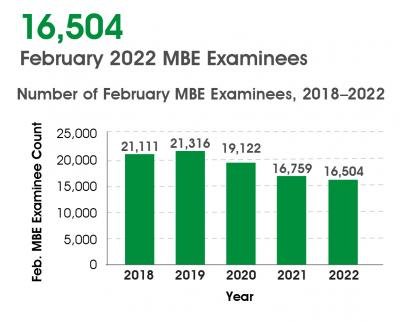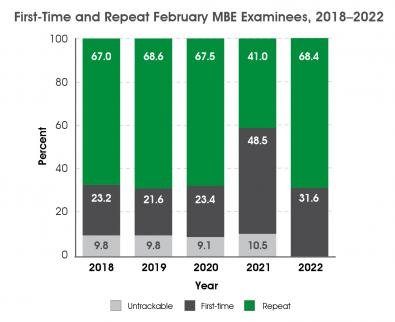National Mean of 132.6 for February 2022 MBE
Average Scores on Multistate Bar Exam Return to February 2020 Levels
MADISON, WISCONSIN, April 8, 2022—The national Multistate Bar Examination (MBE) mean scaled score for February 2022 was 132.6, a return to the February 2020 mean after an increase to a mean of 134.0 last February. This February’s MBE was administered exclusively via paper-based, in-person testing after three administrations (July/September/October 2020, February 2021, and July 2021) in which the MBE was administered both in person and remotely.
NCBE Director of Assessment and Research Rosemary Reshetar, EdD, commented: “There hasn’t been a consistent trend in February MBE results for the past several years, and we should be cautious about reading too much into this year’s February scores. While the mean is slightly lower than last year’s, it is identical with 2020’s mean and very close to 2018’s.”
“A number of factors may be at play in this year’s results,” Dr. Reshetar continued. “In particular, we know that test takers who have previously taken but not passed a bar exam tend to show lower performance on the MBE than first-time test takers, and the majority of this February’s test takers belong to that category. Regardless of the possible reasons for these mean score differences, it’s important to note that the MBE is equated as part of the scoring process to control for any possible differences in exam difficulty compared to previous administrations. Thus, differences in MBE results reflect differences in the composition of the examinee pool, not differences in the test itself.”
16,504 examinees took the February 2022 MBE, about 2% fewer compared to the 16,759 examinees who sat for the exam in February 2021 and about 14% fewer compared to the 19,122 examinees who took the exam in February 2020. Approximately 68% of February 2022 examinees were likely repeat test takers, and approximately 32% were likely taking the exam for the first time. During the period from 2012 to 2020, the percentage of likely first-time test takers ranged from 22% to 28%. [1]
In 2021, however, the number of likely first-time takers of the full MBE was approximately 17 points higher. [2] The characteristics of the February 2021 examinee population were most likely affected by the small number of examinees who had taken an exam during one of the previous summer’s administrations: only 7,906 examinees took a full MBE in July, September, or October 2020, and approximately 29,000 additional examinees sat for a remotely administered exam using NCBE materials in October 2020.
As a result of these differences, any direct comparison of February 2022 results with February 2021 results will be of limited value. February 2022 data is, however, broadly in line with data from pre-pandemic administrations that showed a gradual decline in the overall number of February examinees and a steady increase in the percentage of those examinees who had likely taken but not passed the bar exam on a previous attempt.
The adoption of the Uniform Bar Examination (UBE) across the country was already predicted to lead to a decrease in the number of February examinees and a concurrent decrease in pass rates for that exam in particular. “The UBE is designed to allow examinees to sit for one bar exam in order to apply for admission in multiple jurisdictions. Once an examinee earns a passing score in any of the 39 UBE jurisdictions, they do not need to take the exam again to gain additional admissions, as long as their score meets the passing requirement in the additional jurisdictions where they are seeking admission. Prior to the UBE, these successful examinees may have needed to take bar exams in multiple jurisdictions and often did so in February, and performed well,” Dr. Reshetar said.
Reliability for the February 2022 exam was 0.92, slightly lower than the reliability for February 2021 of 0.93 and consistent with the 5-year average for February administrations. (Reliability is an indicator of the consistency of a set of examination scores, with a maximum value of 1.0.)
Jurisdictions have begun reporting their February 2022 results; bar examination pass rates as reported by jurisdictions are available on the NCBE website. Many jurisdictions are still in the process of grading the written components of the bar exam; once this process is completed, bar exam scores will be calculated and passing decisions reported by those jurisdictions.
About the National Conference of Bar Examiners
The National Conference of Bar Examiners (NCBE), headquartered in Madison, Wisconsin, is a not-for-profit corporation founded in 1931. NCBE promotes fairness, integrity, and best practices in bar admissions for the benefit and protection of the public, in pursuit of its vision of a competent, ethical, and diverse legal profession. Best known for developing bar exam content used by 54 US jurisdictions, NCBE serves admission authorities, courts, the legal education community, and candidates by providing high-quality assessment products, services, and research; character investigations; and informational and educational resources and programs. For more information, visit the NCBE website at https://www.ncbex.org.
About the Uniform Bar Examination
The UBE is a two-day bar examination composed of the Multistate Essay Examination (MEE), two Multistate Performance Test (MPT) tasks, and the Multistate Bar Examination (MBE). It is uniformly administered, graded, and scored and results in a portable score that can be transferred to other UBE jurisdictions. More information about the UBE is available on the NCBE website at https://www.ncbex.org/exams/ube/. As of April 2022, 39 US jurisdictions participate in the UBE, with Pennsylvania administering its first UBE in July 2022 and Michigan in February 2023. More than 40,000 examinees took the UBE in 2021.
[1] The first-time and repeat MBE-based test taker information calculated by NCBE is an approximation based on the NCBE Number and biographic data, which has not been used consistently in all jurisdictions across time. Prior to 2022, approximately 10% of examinees were unable to be tracked with certainty by NCBE as either first-time or repeat takers due to a lack of sufficient biographic information. As of 2022, all jurisdictions have provided the necessary information for a sufficient number of administrations to allow for adequate tracking.
[2] Because information about first-time and repeat test takers is based on whether an examinee has previously taken the MBE, attempts made by examinees who sat for an exam during the July 2020 exam cycle but did not take the full, in-person MBE are not reflected in the determination of status. As a result, it is likely that first-timer values for February 2021 are somewhat inflated and those of repeaters are depressed.


